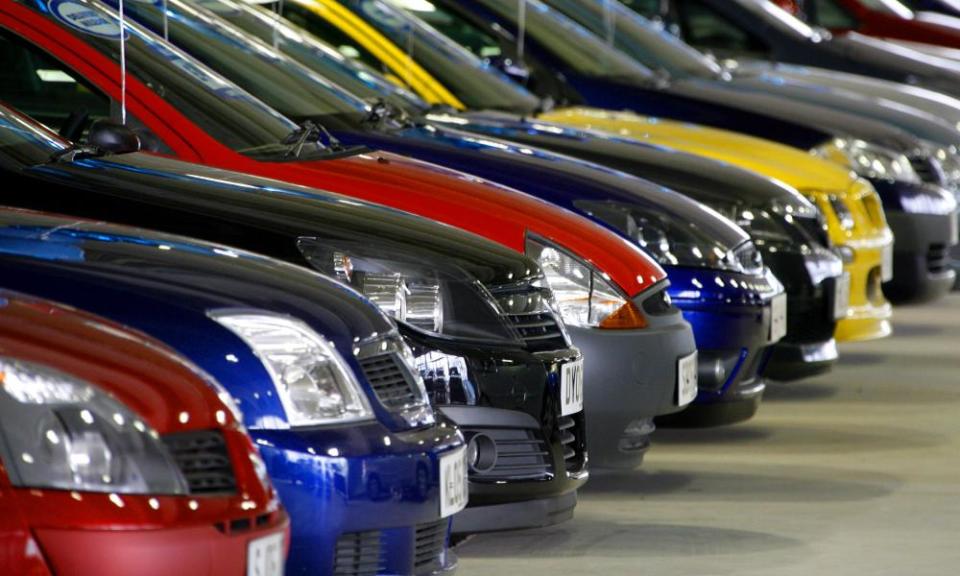Shares in UK's biggest car dealer Pendragon fall by 17%

Shares in the UK’s biggest car dealer have plunged by 17% after a surprise profit warning which also raised further fears over consumer spending.
The alert from Pendragon, which trades under the Evans Halshaw and Stratstone fascias, and sold 275,000 new and used cars last year, is the latest in a raft of profit warnings issued in recent weeks by UK companies blaming worsening consumer confidence.
Pendragon, which sells all the main marques, said demand for new cars was sliding and the market had peaked. It now expects to make £60m of underlying pretax profits this year, down sharply from a previous forecast of £75m, which was similar to last year’s figure.
The shares plunged 23% in early trading and later traded 17% lower at 23.74p.
The company said sales had stalled in the summer. It now expects the new car market to continue to decline this year and into the first half of next year. Its chief executive, Trevor Finn, blamed dwindling demand coupled with oversupply from “manufacturers with ambitious objectives”.
“We had a very strong first quarter, a good second quarter and then demand waned ... in the big selling month of September and the run-up to it,” he said. September is a key month for car sales because number plates change. In the first six months of 2017, Pendragon made a profit of £48.5m, up 9.7% on a year earlier.
Figures from the Society of Motor Manufacturers and Traders showed new car registrations in the UK fell for a sixth month in September, leaving the market on course for its first annual fall since 2011. The motor industry body blamed declining consumer confidence, which it said was caused by uncertainty over Brexit and confusion over air quality plans.
The car sales boom of recent years has been underpinned by cheap finance and personal contract plans, which now account for 82% of all of new car registrations. Bank of England economists, writing in a blogpost entitled Car finance – is the industry speeding? said: “The industry’s growing reliance on PCP [personal contract purchase] has made it more vulnerable to macroeconomic downturns.”
Finn said he expected Pendragon to make higher profits again next year, adding it would take manufacturers time to respond to the drop in demand by scaling back production.
Profits have also taken a hit because manufacturers and dealers, including Pendragon, have been selling large numbers of luxury cars at big discounts, although not at the very top end. Ferrari, for example, is not doing this, he said.
Britain’s car dealers are sitting on 16% more unsold stock than they were a year ago, according to accountancy firm UHY Hacker Young. It said carmakers were pushing more vehicles on to dealers’ books while dealers continued to struggle to hit manufacturers’ tough sales targets.
UHY Hacker Young said the value of inventory held by car dealerships had risen to a record £27.3bn, up from £23.6bn a year ago. This equals 17.7% of the turnover of the sector, up from 16.9% last year.
Paul Daly, a partner at UHY Hacker Young, said: “Manufacturers have traditionally used the UK market to absorb excess production from other European markets, as we tend to replace our cars more frequently than consumers in other countries do. We may soon start to bump up against the limits of that tactic.
“Pressures on dealers are higher than ever before, with manufacturers demanding bigger and better premises, and many now need to resort to significant off site storage facilities to hold the excess stocks.”
The car industry is facing significant changes in coming decades, from self-driving vehicles to a new clampdown on pollution. Britain is to ban all new petrol and diesel cars and vans from 2040.
Profit and sales warnings on the rise
In the three months to the end of September, 75 UK stock market listed companies issued profit warnings, compared with 45 in the previous quarter, according to accountancy firm EY – the biggest quarterly rise in nearly six years. Other businesses have reported falling sales and declining consumer confidence.
Merlin Entertainment
Shares in the Alton Towers, Madame Tussauds and Legoland owner slumped nearly 20% in early trading last Tuesday after it warned that profits for the year would be flat, after a difficult summer when trading at its theme parks and attractions across Europe were adversely affected by terrorist attacks and bad weather.
Unilever
The multinational consumer products group behind brands including Dove and Marmite last week reported declining sales growth in the third quarter, blaming extreme weather events in the US and Mexico and a disappointing performance from its ice-cream products, which include Magnum and Ben & Jerry’s. Shares fell 5% on the day of the announcement.
Reckitt Benckiser
The company behind Durex and Dettol announced plans to split its business into two divisions – consumer healthcare and home and hygiene products – and forecast flat like-for-like sales for the full year after reporting its sixth straight quarter of weak results last week.
Carillion
Shares in the construction and support services group plunged nearly 40% after it warned on profits and announced its chief executive was departing in July. Carillion booked an £845m writedown on three big UK public-private partnership projects, including the Royal Liverpool University hospital, and the cost of pulling out of construction projects in the Middle East and Canada. It said it would no longer bid for big construction projects and instead focus on support services in rail, road, telecoms and power networks as well as central and local government buildings.

 Yahoo Finance
Yahoo Finance 